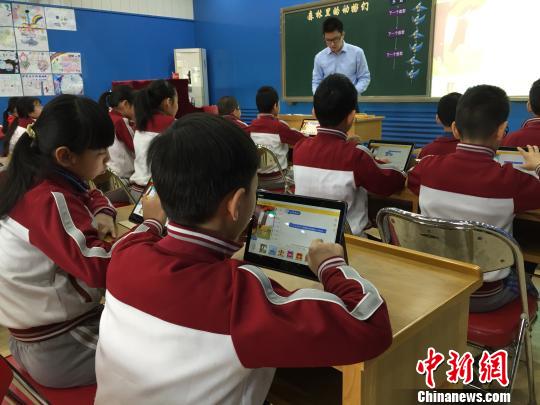Beijing expert: Programming education in primary and secondary schools is by no means to cultivate "code farmers"

Pupils perform programming operations under the guidance of teachers. Photo by Zheng Jiawei
BEIJING, Beijing, December 22 (Zheng Jiawei) "Programming education is not to cultivate code farmers, but to cultivate students’ programming ability, and the most important thing is the process, which trains the way of thinking in the process of presenting logical thinking and finally solves practical problems in life." Dr. Yu Xiaoya, a professor at Beijing Institute of Education, said.
On the 21st, an observation activity and seminar on innovative classroom teaching of programming education in primary and secondary schools was held in Beijing. On the day of the meeting, teachers from all over the country gathered in the No.1 Primary School of Exhibition Road, Xicheng District, Beijing to observe the programming demonstration class provided by the No.1 Primary School of Exhibition Road, and discuss how to further cultivate students’ innovative thinking and practical ability after the course.
In the demonstration class, under the guidance of the teacher, the students in Grade 5 of the primary school used the programming cat tool to complete the animation production and the programming of the voice-activated lighting system, respectively. Many students said that they liked the hands-on operation in class very much and wanted to continue to play programming when they got home.
Guan Jiying, one of the two teachers who participated in the demonstration class, was responsible for teaching the programming of acoustic control lighting system. After the students finished the basic programming of acoustic control system, she further inspired the students to think about the practical application of acoustic control system, and finally guided the students to program the noise indicator system. When the surrounding voices were normal, the green light turned on, but when the voice was too loud, it turned red.
On July 8th, this year, the State Council issued the Development Plan of the New Generation of Artificial Intelligence, specifically proposing to implement the national intelligence education project, set artificial intelligence related courses in primary and secondary schools, gradually promote programming education, and encourage social forces to participate in the development and promotion of educational programming teaching software and games.
Zhu Hui, a researcher in Xicheng District, Beijing, said in an interview with Zhongxin.com that although the State Council issued a notice to add programming to the classrooms of primary and secondary schools, schools still need to choose appropriate programming tools in the actual operation process to make this requirement a reality.
According to Zhu Hui, programming education in Xicheng District has always been in the forefront of Beijing. From the first computer elective course in 1982 to the graphical programming language education with "programming cats", it has always focused on cultivating students’ procedural thinking and solving problems in real life. (End)